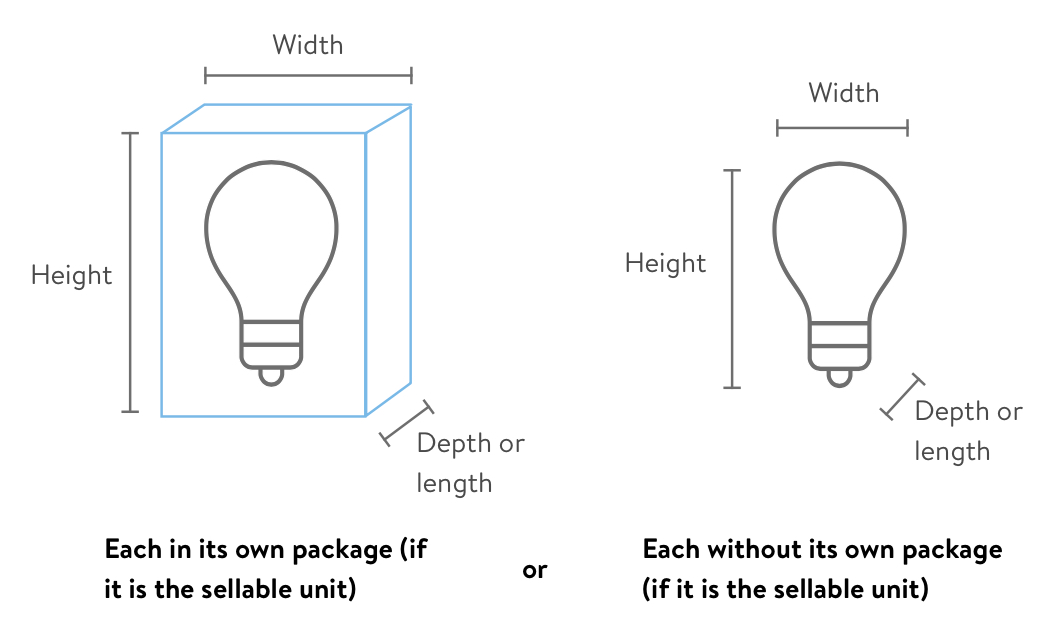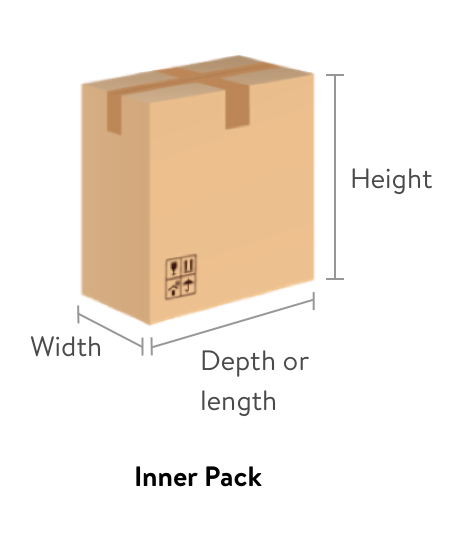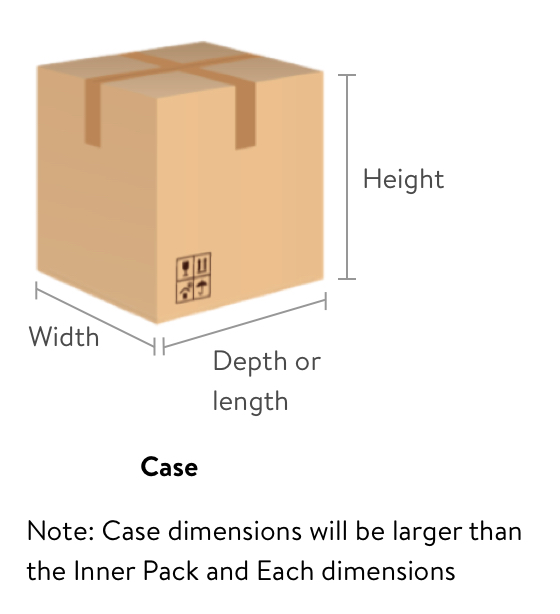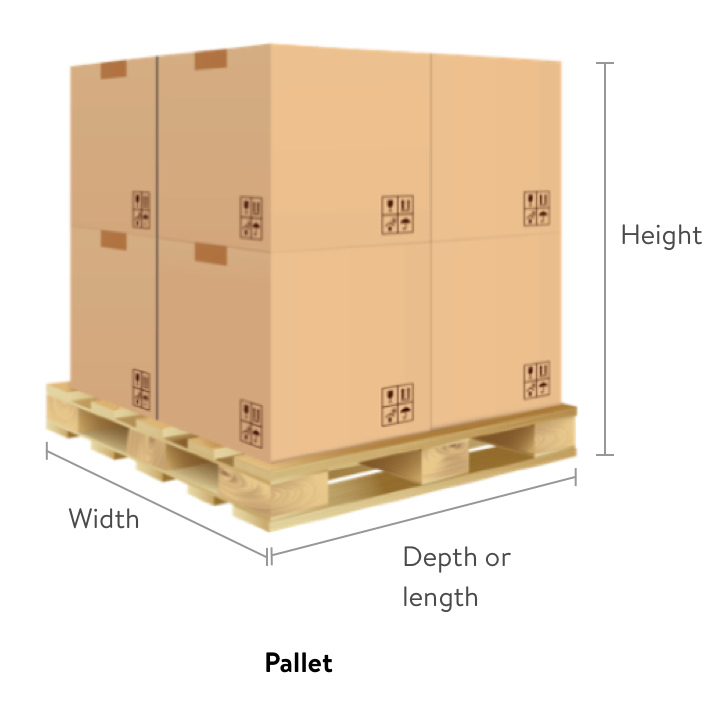Understanding Trade Item Configurations and Dimensions
Some attribute names have changed, so here's a quick guide:
Legacy Attribute Name(s) | Attribute Name in Supplier One | Definition or Instructions in the Item Setup Spreadsheets |
Supplier Pack GTIN Vendor Pack GTIN Case GTIN Supplier Pack Case UPC | Orderable GTIN | The GTIN submitted as the Orderable GTIN. |
Supplier Pack Quantity Vendor Pack Quantity | Orderable Pack Quantity | The quantity of sellable items associated to the GTIN submitted as the Orderable GTIN. |
Warehouse Pack GTIN Warehouse Pack UPC | Warehouse GTIN | If you have indicated that the configuration is a break pack, then the Warehouse Pack will be set to the level directly below the Orderable GTIN indicated in the spreadsheet. |
Warehouse Pack Quantity | Break Pack Quantity | Corresponds to the quantity of sellable items of the trade item directly below the Orderable GTIN. |
UPC/UPC Code | Sellable GTIN | The GTIN submitted as the consumable (selling) unit, i.e., the item that the customer will purchase. |
Trade Item Configurations
A Trade Item Configuration (aka Trade Item Hierarchy) describes how Walmart can order an item based on your available Trade Items. Multiple ordering configurations can use the same Trade Item, but each ordering configuration should be entered separately on the Trade Item Configurations tab of the item setup spreadsheet.

A Trade Item is a logistical unit. There are four possible types of Trade Items:
- Each (EA)
- Inner Pack (PK)
- Case (CA)
- Pallet (PL)
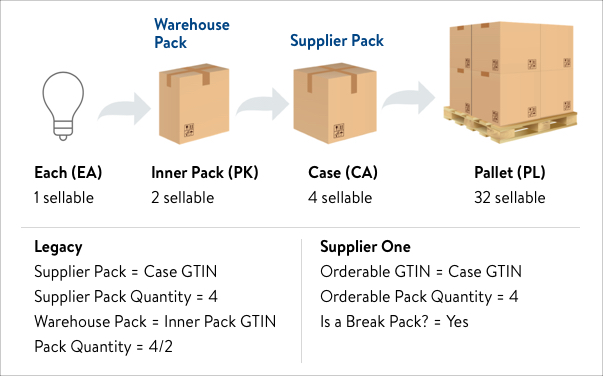
Orderable Pack Quantity
The Orderable Pack Quantity cannot be more than 12 times the quantity of the next lower Trade Item. In the example shown above, the Orderable Pack Quantity cannot exceed 24 (i.e., 2 x 12).
Is a Break Pack?
A break pack indicates that the orderable configuration (e.g., a Case) needs to be opened at the Walmart DC to send the next lower Trade Item (e.g., an Inner Pack) to the store.
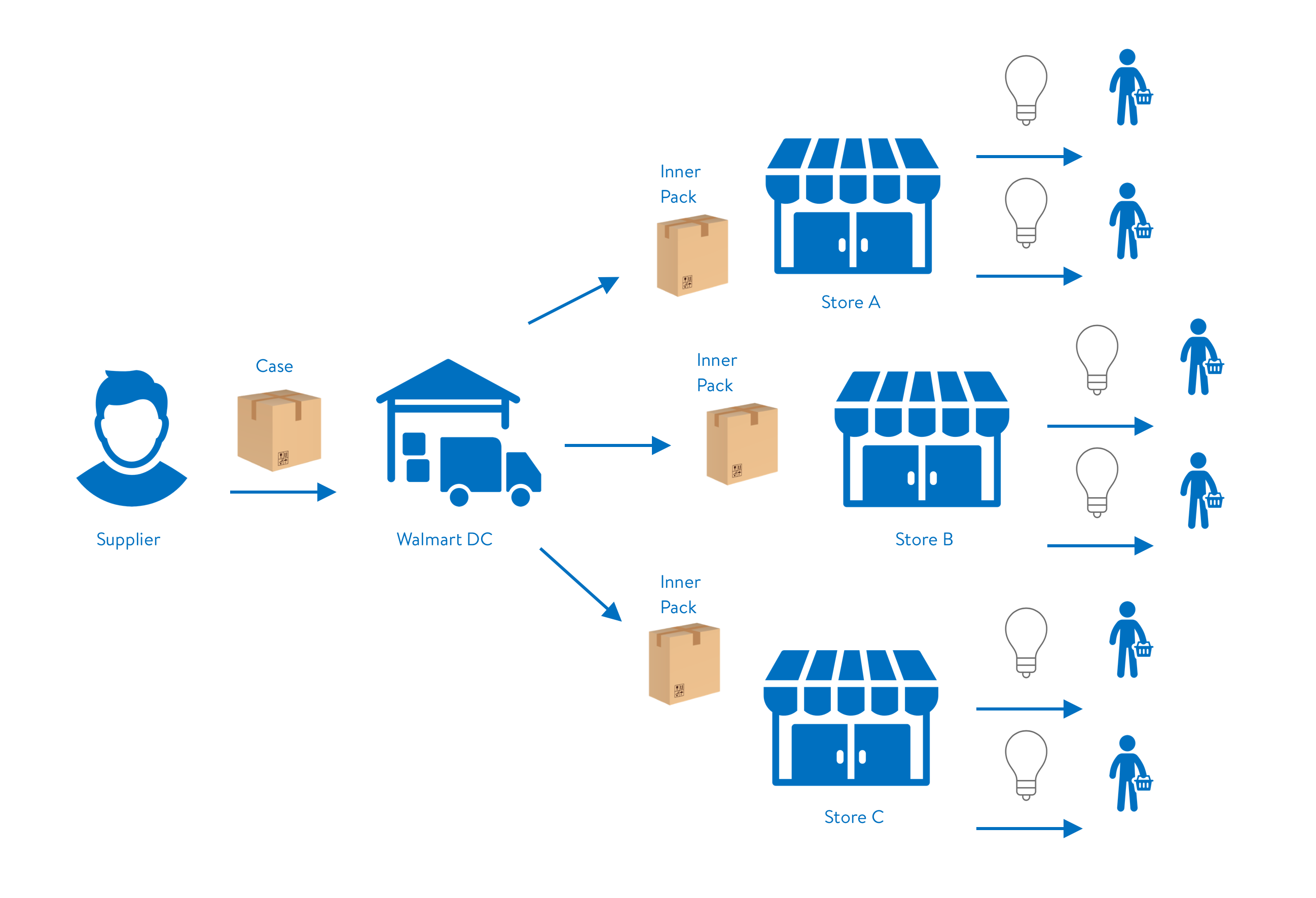
Providing Trade Item Configurations During Item Setup
See the last column for examples of the Trade Item Configurations tab for the configurations below.
Pack Qty (Legacy) | Trade Item Hierarchy | Sellable | Orderable | Is a Break Pack? | Spreadsheet |
1/1 | EA | EA | EA | No | If you have a synchronized hierarchy that pre-populates in your spreadsheet, you do not need to remove any trade items from your spreadsheet. Just indicate that the EA level is both sellable & orderable. |
1/1 | PK | PK | PK | No | |
1/1 | CA | CA | CA | No | |
5/5 | EA > PK(5) | EA | PK | No | |
10/10 | EA > CA(10) | EA | CA | No | |
10/5 | EA > PK(5) > CA(10) | EA | CA | Yes | |
10/1 | EA > CA(10) | EA | CA | Yes | *This is an example template for Break Packs where the EA is the item being sent to Stores, ofter seen in large items like Vacuums* (For variety packs, the Each level is not required.) |
Trade Item Dimensions
You'll need to provide dimensions for the Trade Items relevant for each Sellable GTIN.
Shipping Dimensions
Shipping dimensions are utilized for the packaging that the item is shipped to the customer in. They should be larger than the Each dimensions but smaller than the Case dimensions.
Attribute | Definition |
Shipping Dimensions Height (in) | The vertical measurement from top to bottom with the product in the packaged/shipping container. |
Shipping Dimensions Depth (in) | The longest horizontal measurement from front to back with the product in its packaged/shipping container. |
Shipping Dimensions Width (in) | The shortest horizontal measurement from front to back with the product in its packaged/shipping container. |
Shipping Weight (lbs) | The weight, including all its packaging materials. |
Cost
Attribute | Definition | Example |
Cost | The cost formerly known as Supplier Pack Cost on Legacy Form 33. To calculate the cost information, multiply the Unit Cost by the Orderable Pack Quantity. | If Unit Cost is $4.90 and the Case Pack is 12, then Cost is $58.80 |
Site Start Date
Attribute | Definition | Example |
Site Start Date | Site start date now requires you to include the time the item is going live. Enter in this format: YYYY-MM-DD HH:MM:SS | 2025-01-31 00:00:00 |
Q&A
How do I set up a 1/1 configuration?
To set up a 1/1 configuration (Orderable Pack Quantity = 1; is not a Break Pack): Your Sellable GTIN should be the same as the Orderable GTIN, and be sure that there is a matching GTIN under the section with the green headers on the Trade Item Configurations tab of your item setup spreadsheet.

How do I determine the pack size?
Your pack size is determined by the number that you provide for the Quantity of Sellable Units in the Case GTIN section.
If the... | You will create the item as a... |
Orderable GTIN = Each GTIN | 1/1 configuration |
Orderable GTIN = Case GTIN | Case Pack configuration, and the Quantity of Sellable Items determines the pack size For example:
|
Orderable GTIN = Case GTIN and Each GTIN ≠ Inner Pack GTIN ≠ Case GTIN and Is a Break Pack? = Yes | Break Pack configuration, and the Quantity of Sellable Items for the Inner Pack GTIN and Case GTIN determine the pack size For example:
|
Courses & Additional FAQs
Our Trade Item Hierarchy course offers insights into understanding the GS1 Standards and how to build a successful trade item hierarchy during Walmart item setup (i.e., GTIN standards and accuracy, etc.). It also covers common trade item errors and resolutions.
Refer to our Trade Item Hierarchy FAQs for answers to other questions about trade item hierarchy.
Have Other Questions or Need Help?
If you experience any issues viewing and managing your catalog, please click "Help" in the top navigation menu and select "Manage tickets" to file a case ticket. Or, select "Chat" to get real-time help from our chat bot or click "Search articles" to search Supplier One HelpDocs.
Make sure to select the issue type Items and Inventory.
